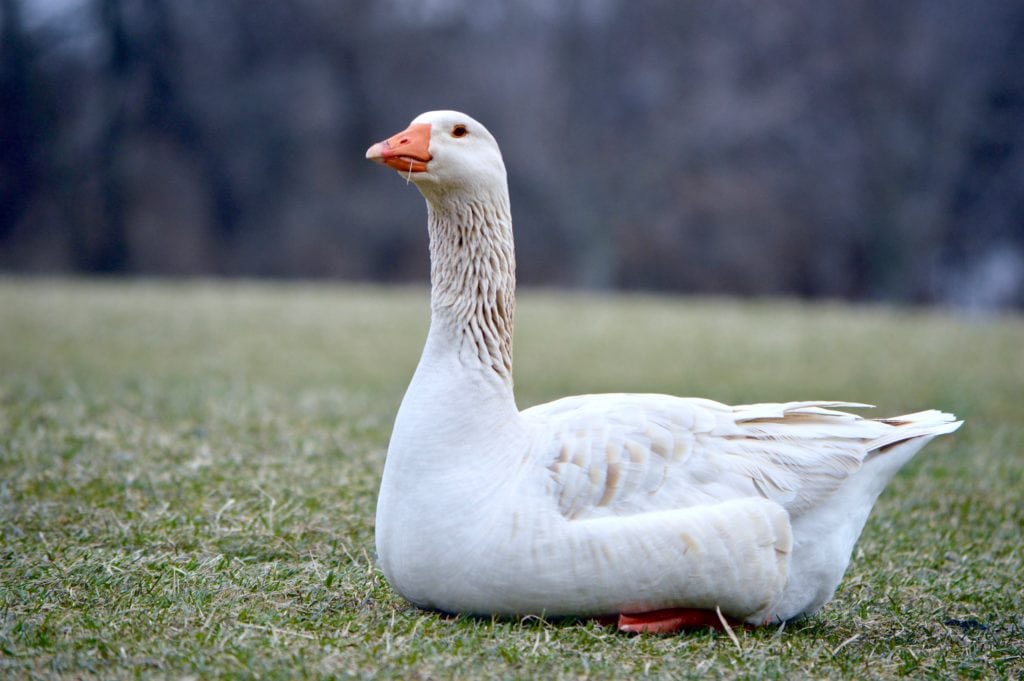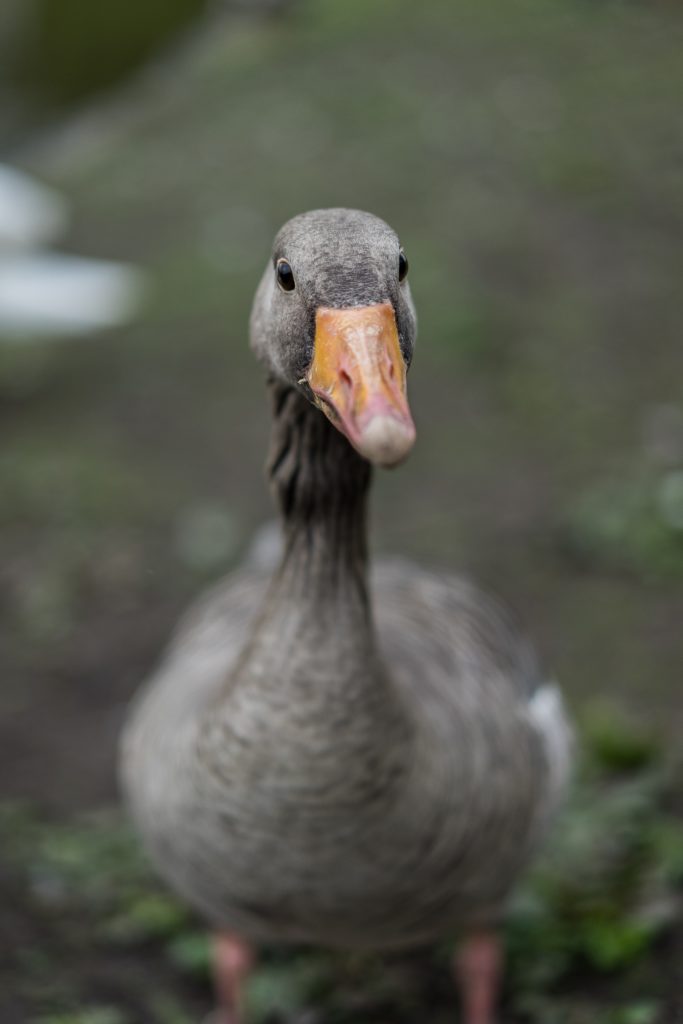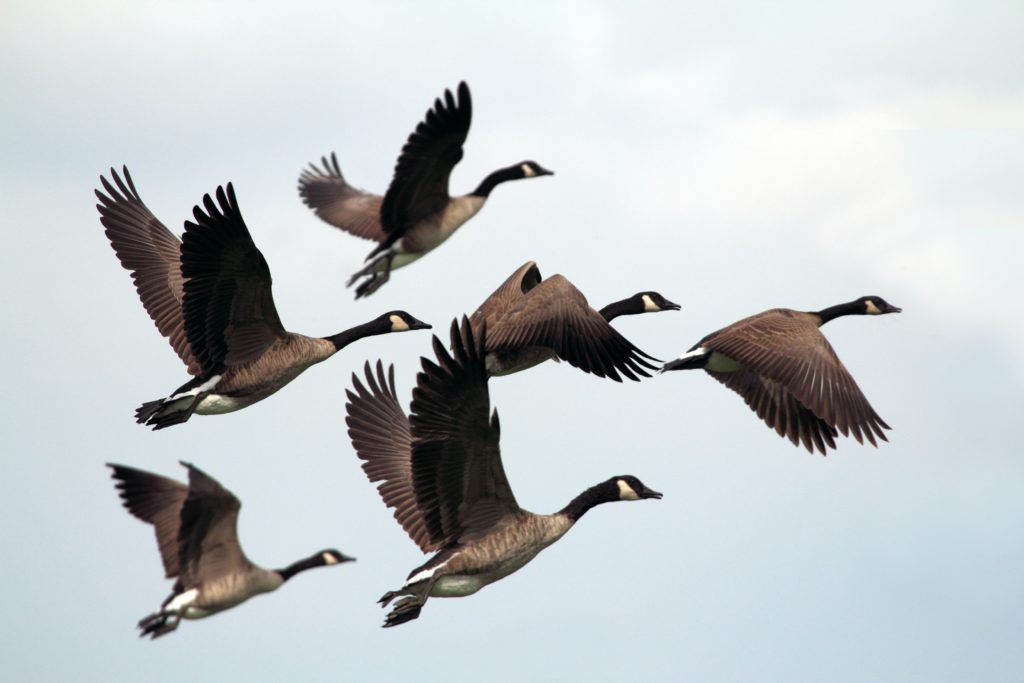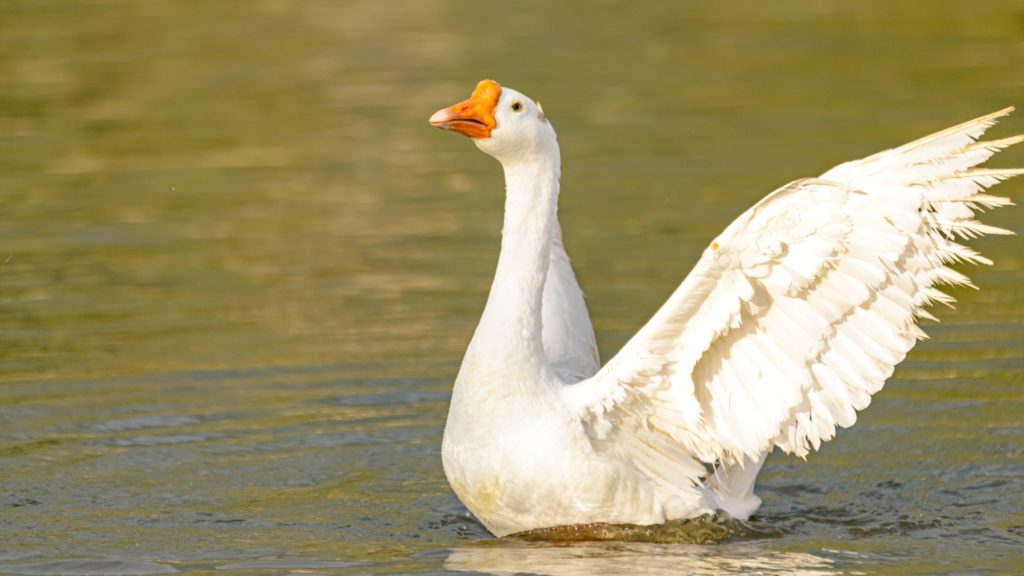Let’s be honest, geese tend to have a bad reputation. Mention the fearsome Canada Goose in polite conversation and you can expect to hear a slew of horror stories and murmurs of distrust. Though these anecdotes are usually on the silly side, it’s quite common for people to express a genuine distaste for geese. Certainly, it is true that feral geese do have a tendency to hiss at picnic-goers from time to time. Territorial geese may even chase or nip the unfortunate folks who wander a bit too close. But honestly, how can a bird that scarcely outweighs a terrier strike fear into the hearts of so many. And what does this mean for those of us who cherish the honking overhead as geese perform their yearly migrations? Those of us who truly love the mighty goose must ask whether this reputation for ferocity is entirely earned.
To examine humanity’s relationship with geese, we would need to begin over three thousand years ago in ancient Egypt. It is believed that this is when humans began to domesticate geese. (1). The agricultural relationship between humans and geese continues to this day. Geese, as a matter of fact, are often treasured by farmers for their vigilance and courage. Left to graze with flocks of ducks or chickens, geese will watch for threats, alert the whole flock to danger, and even chase off predators. For this reason, geese are often kept in flocks as “guard dogs.” (2)
A fearless bird indeed, it becomes easier and easier to understand why many people are intimidated by geese. Geese, however, have a much softer side as well. They are often lauded as symbols of fidelity and parental devotion. Many species of geese are monogamous, with some even forming bonds that last for their entire lifetimes. (3)
The goose is a bird that appears in many cultural traditions, cuisines, and idioms. No matter what opinion you have of geese, their impact on humanity cannot be avoided. For people with a spiritual connection with geese, this impact is a guiding force. For people who appreciate these birds, it is a reminder of the many interesting roles that geese fill. Perhaps, for those who dislike geese, it might serve as an opportunity to learn about the many facets of the goose.
Goose Symbolism and Meaning
Geese can symbolize many different things. Their domesticity and proximity to human cultures have allowed a long and complex relationship to form between humanity and geese.
One aspect of goose symbolism focuses on their role as livestock. In this context, geese represent prosperity and abundance. They are common choices for the starring role on the table at a holiday feast and so represent festivity and a bountiful harvest.
Geese are also connected with fairy tales. Many fairy tales and nursery rhymes are referred to as “Mother Goose” stories. This is because Mother Goose is the fictional narrator of certain collected children’s stories. In addition, geese feature in a number of these stories. In Jack and the Beanstalk, for example, the fearsome giant jealously guards his treasured goose which lays golden eggs. This story is responsible for the idiom “golden goose,” and the symbolic connection between geese and wealth.

Additional meanings for geese include parental devotion, romance, silliness, mischief, courage, and even faith and holiness. We will explore many of these meanings further as we explore the goose’s role in various cultures.
Goose Native American Symbolism
In Native American traditions, geese have varying associations. They are a treasured source of food and are often connected with prosperity and abundance. In addition, stories connect geese with wisdom, gullibility, marriage, and parenthood.
Goose Christianity Symbolism
In Christian iconography geese represent fidelity, faith, and the “flock” of Christ’s followers. Also, the wild goose is the Celtic Christian symbol for the Christian faith and the Holy Spirit.
Goose Celtic Symbolism
As stated above, in Celtic traditions wild geese were connected with the Holy Spirit. Celtic traditions treated the Holy Spirit as a dramatic and surprising force. This vision of the divine scarcely aligns with the demure and docile reputations of traditional Christian icons, such as the dove and the lamb. These symbols are fantastic representatives of purity, but for imagery involving disruption it is not hard to imagine just why the goose is better suited. (4)
Goose in Dreams
Dreaming of a goose is generally lucky. Geese in dreams often represent a sudden windfall of good fortune or bounty.
Dreaming of being chased or harassed by geese can be a sign that there is a problem in your life that you are neglecting to confront. Geese in dreams can act as reminders that running away from problems is rarely a viable solution.
Dreaming of wild geese represents a spiritual change or disruption. Though sudden changes may be uncomfortable, these inconveniences often present themselves as opportunities to grow. Take courage from the fearless goose and embrace change as much as you can.
Goose Encounters and Omens
Geese are not uncommon birds to encounter at your local park or waterway. Though these encounters are common, they can still have a big impact on those involved.
Encountering geese with their young is a sign that you can look forward to multiplying blessings in your future. This can mean financial opportunities, emotional growth, or even a new addition to the family!
An encounter with aggressive geese is a sign that you have entered unfamiliar territory in your life. Fear of the unknown is strong, but sometimes facing this fear is necessary to become the person you’re meant to be.
Goose in Mythology & Folklore
Geese are present in so much folklore that we can’t possibly summarize all of it in one article. Instead we will cover the most significant, bizarre, and interesting goose-related myths and folklore from a number of cultures.

One bizarre myth dating back to the twelfth century held that Barnacle Geese do not lay eggs. This myth claimed instead that these geese sprang, fully-formed, from barnacles, or alternatively that they grew from trees. This myth likely formed due to confusion surrounding birds that migrate long distances and disappear for part of the year. (5)
Native American Mythology:
In several Native American traditions, there is a story in which the great hero of the culture’s mythology tricks a group of geese into becoming his meal. The Ojibwe version of this myth follows the hero Wenebojo as he distracts the geese from his true intentions by teaching them a dance.
“He went on along the lake and began to get hungry. He saw some geese swimming a little off shore and thought to himself, “Now, I would like some of those geese to eat.” Wenebojo then gathered some balsam boughs in an old dirty blanket he was carrying and, with this on his shoulder, he called to the goslings and offered to teach them some of the songs he was carrying in his bag. They all crowded in to shore, and he told them they must dance just like he did, singing the song he would teach them. He sang, “A dance on one leg. Oh my little brothers!” And as they danced on one leg, they stretched their necks upward. Then Wenebojo sang, “A dance with my eyes closed, oh my little brothers!” And Wenebojo danced and stretched, and the little goslings all did as he did, closing their eyes and stretching themselves. Wenebojo then moved among the foolish goslings and began to break their necks. Just then, the Loon, who had been dancing with the other birds, opened his eyes and immediately began to cry, “Look out, we are being killed by Wenebojo!”” (6)
Egyptian Mythology:
The Egyptian god Geb was often depicted with the head of a goose. (7) Geb was an important god. He was associated with the earth and was the father of Osiris, king of the land of the dead.
Additionally, early Egyptian mythology refers to the creator god as “The Great Cackler.” This deity is considered to be one and the same as Geb. Geb, or “The Great Cackler,” was believed to have laid the primordial egg from which the sun had hatched. Because of this, the sun itself was also connected with geese. (8)
Indian Mythology:
In Indian mythology, the creator god Brahma is connected to the goose. The “vahana” of a Hindu god is the animal that it is often depicted as riding. For Brahma, this animal is a bird called the “Hamsa.” The Hamsa is usually depicted as a swan, but this creature has been interpreted as being a swan, a goose, or even a crane. (9)
Bearing a fascinating resemblance to the Egyptian story of Geb, some versions of Brahma’s mythology depict him as bearing a giant golden egg from which all of creation springs. (10)
Greek Mythology:
A memorable Greek myth involves Zeus seducing the goddess Leda in the form of a swan. Their union is said to beget Helen, the most beautiful woman to ever live and the catalyst of the Trojan war. In some earlier versions of this tale, though, Zeus is not pursuing Leda. Instead he chases Nemesis, the goddess of fortune, as the two of them transform into a variety of creatures. Eventually they mate in the form of geese. To hide his infidelity from Hera, Zeus sends the resultant egg to Leda to rear. In this version, too, Helen is born of this egg. (11)
Additionally, geese are often connected to the goddess Hera and her Roman counterpart Juno. Ironically, Hera represents fidelity and marriage. Her votive animals reflect these values.
Through their connections with Hera and their virtuous traits, geese became very important animals in Roman culture. They were admired for their vigilance and applauded for allegedly alerting the Romans to a nocturnal attack by the Gauls. (12)
Goose Spirit Animal
If the goose is your spirit animal then you are likely courageous, outgoing, and incredibly protective over your loved ones.
People with the goose spirit animal can be a bit impulsive. Their emotions tend to run very passionate, and they are unafraid to confront problems or speak their minds.
Despite their impulsivity, people with the goose spirit animal are often very responsible. They tend to feel a strong sense of duty towards their loved ones. This often manifests as intense empathy and vigilance against dangers.
The impulsivity of the goose spirit animal shows when they perceive a threat to their loved ones or to their space. People with the goose spirit animal are fiercely territorial. When they recognize a threat, they are more likely to act than to strategize.
Goose Totem Animal
The goose totem animal is defined by its connection to the family. People with the goose totem animal tend to feel a very strong calling to start a family and watch it grow.
The goose totem animal treasures its legacy and the opportunity to take wisdom from its elders and share that wisdom with future generations. People with this totem tend to want large families.

For people with the goose totem animal, home is an important concept. Although geese do migrate yearly, they always return to the same nesting sites year after year. (13) Similarly, no matter where life takes them, individuals with the goose totem will always feel a tug in their hearts pulling them towards home.
Goose Power Animal
The power of the goose is perception. People with the goose totem animal are observant and vigilant.
These traits are excellent complements for the protective nature of the goose. Perception is more useful, even, than vigilance. This trait allows individuals with the goose power animal to notice patterns and adapt to almost any situation.
As a result, people with the goose power animal are excellent at thinking on their feet and predicting the right course of action.
Goose Tattoo Meaning
A goose tattoo can represent almost anything. Common meanings for a goose tattoo include family, wealth, good luck, courage, mischief, and faithfulness.
Conclusion
From geese that grow from barnacles to myths of creator gods laying goose eggs containing all of creation, the goose has a clear and fascinating effect on humanity’s imaginations.
Ferocity certainly belongs on the list of meanings that can be attributed to geese. After all, the goose is one of very few wild animals that possess no deadly fangs, venom, or claws, and yet, will still demonstrate the reckless courage needed to attack a much larger human. This courage is downright intimidating.
It’s no surprise, then, that many people feel fear or distrust towards geese. It is, however, a great shame that these individuals must miss out on all of the other virtues that geese have in abundance.
Not least among the virtues of the goose is the fact that geese often remind humanity that even in our landscaped public parks, nature is not one to entirely submit to human influence. Even among domestic animals, the wilderness of nature cannot be completely tamed or extracted. Of all of the magnificent qualities that geese have, I think this is the one that I treasure the most.


I love this! I love geese and all there personalities. The have strong family values and behave better than 90% of humans. When you gain there trust for me it’s a huge compliment. When they fight it sucks, but they have to establish themselves. I’ve been through hell the last few years and I can say from my heart… If it wasn’t for the Canada geese in my area and the bond we created, I wouldn’t be here right now. Just hanging out and having quiet time and observing them and then building a relationship and watching them build families and being a part of all that and building a relationship yet having respect for them it was a healthy distraction for me I was not in a good space and I’m I do anything to protect them and make sure they thrive people could learn a lot from them. I know there’s a lot of people that don’t like them and complain but you know what they give you every single opportunity to walk away there’s no doubt in anybody’s mind if they are giving you a fair warning just walk away you don’t need to screw with them I’ve watched more people push their luck and I just laugh and say you know what you ask for it it’s not the goose is fault people have no respect or boundaries with nature and if you don’t have a connection and know anything you best just stay away. I’ve never seen a goose attack for no reason and the times I have if they weren’t going to do it I was cuz it’s absolutely ridiculous the disrespect people have today not just with geese but just with nature in general all the garbage I pick up and all the stupidity that people do it’s just ridiculous so thank you for this wonderful love read and I appreciate all you said. I’ve been so looking for an in-depth study or paper or something some of them with Canada geese cuz everything’s usually so generic this is kind of a breath of fresh air but if you could push me in the direction of someone that wrote it end up paper in a study on the Canada geese I would love to read it and compare my notes I’ve spent so much with time with them I think I could write my own notes but I just would like to the other perspective. Thanks again.
I just moved to West Sacramento, I adore waking at 4:30 am and having my coffee and my Canada Geese fly by EVERY morning. Listening to their honking starts my day.
My question is what the specific omen of finding one goose egg (canadian geese) with many grey down feathers around it, was on rocks by the river… i revered it with much respect, almost like i was afraid and cane across something sacred, backed away slowly and left! Then had a reading about angels leaving feathers, I’m like this was most likely a big sign from god! Being as its a creation origin of all the oldest cultures, I’d say so! Neighbors talk of eating goose eggs, i will tell them oh no! You respect that as if God will lay a horrible curse on you man! Eating the creation egg? Oh the end is inevitable they’ll say- perhaps, but don’t be responsible for it or own any of the negative consequences there of i would strongly warn….